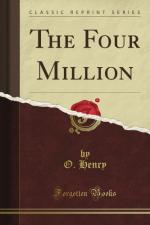But the chief thing at Cypher’s was Milly. Milly was a waitress. She was a grand example of Kraft’s theory of the artistic adjustment of nature. She belonged, largely, to waiting, as Minerva did to the art of scrapping, or Venus to the science of serious flirtation. Pedestalled and in bronze she might have stood with the noblest of her heroic sisters as “Liver-and-Bacon Enlivening the World.” She belonged to Cypher’s. You expected to see her colossal figure loom through that reeking blue cloud of smoke from frying fat just as you expect the Palisades to appear through a drifting Hudson River fog. There amid the steam of vegetables and the vapours of acres of “ham and,” the crash of crockery, the clatter of steel, the screaming of “short orders,” the cries of the hungering and all the horrid tumult of feeding man, surrounded by swarms of the buzzing winged beasts bequeathed us by Pharaoh, Milly steered her magnificent way like some great liner cleaving among the canoes of howling savages.
Our Goddess of Grub was built on lines so majestic that they could be followed only with awe. Her sleeves were always rolled above her elbows. She could have taken us three musketeers in her two hands and dropped us out of the window. She had seen fewer years than any of us, but she was of such superb Evehood and simplicity that she mothered us from the beginning. Cypher’s store of eatables she poured out upon us with royal indifference to price and quantity, as from a cornucopia that knew no exhaustion. Her voice rang like a great silver bell; her smile was many-toothed and frequent; she seemed like a yellow sunrise on mountain tops. I never saw her but I thought of the Yosemite. And yet, somehow, I could never think of her as existing outside of Cypher’s. There nature had placed her, and she had taken root and grown mightily. She seemed happy, and took her few poor dollars on Saturday nights with the flushed pleasure of a child that receives an unexpected donation.
It was Kraft who first voiced the fear that each of us must have held latently. It came up apropos, of course, of certain questions of art at which we were hammering. One of us compared the harmony existing between a Haydn symphony and pistache ice cream to the exquisite congruity between Milly and Cypher’s.
“There is a certain fate hanging over Milly,” said Kraft, “and if it overtakes her she is lost to Cypher’s and to us.”
“She will grow fat?” asked Judkins, fearsomely.
“She will go to night school and become refined?” I ventured anxiously.
“It is this,” said Kraft, punctuating in a puddle of spilled coffee with a stiff forefinger. “Caesar had his Brutus—the cotton has its bollworm, the chorus girl has her Pittsburger, the summer boarder has his poison ivy, the hero has his Carnegie medal, art has its Morgan, the rose has its—”
“Speak,” I interrupted, much perturbed. “You do not think that Milly will begin to lace?”




